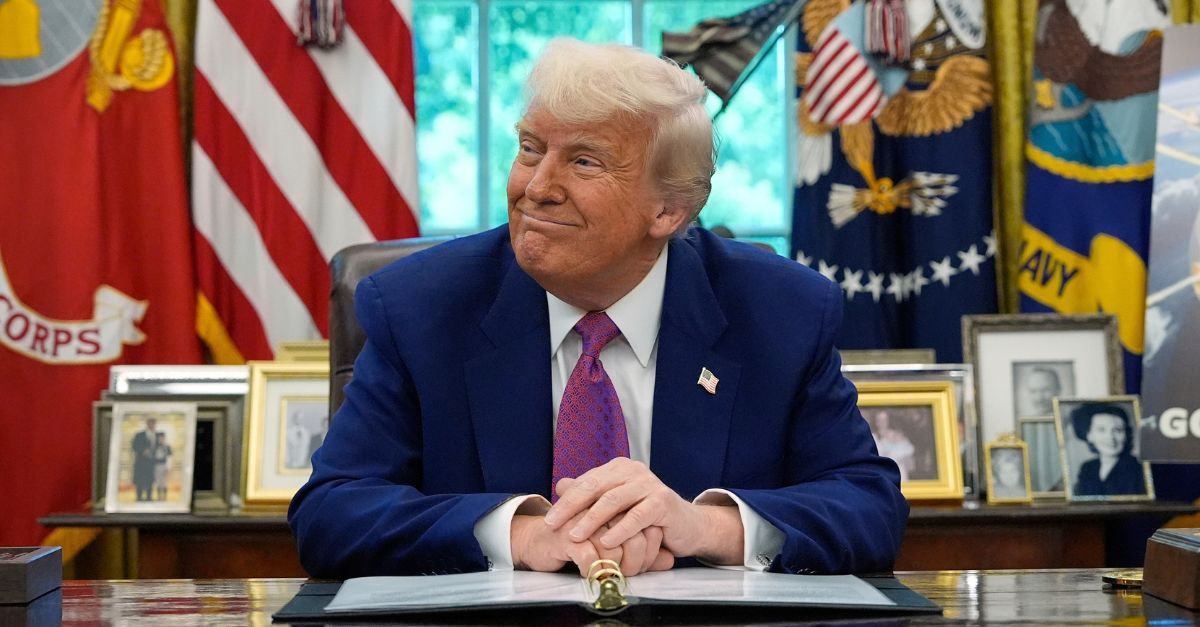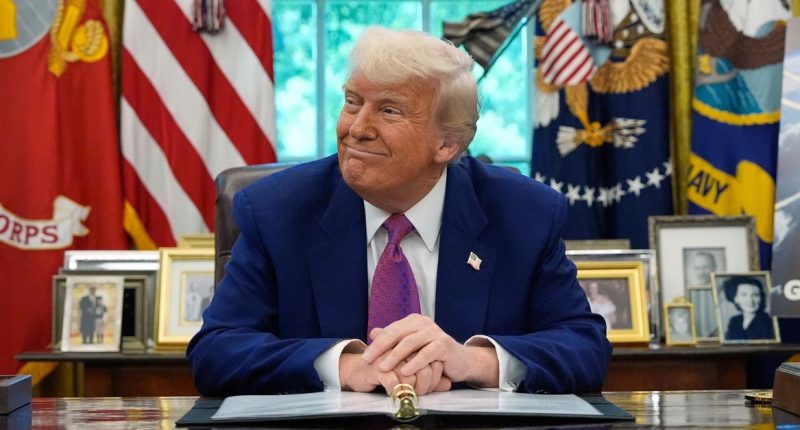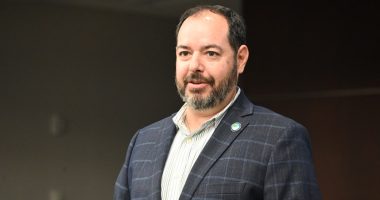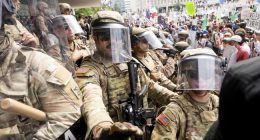
President Donald Trump smiles as he speaks in the Oval Office of the White House, Tuesday, May 20, 2025, in Washington (AP Photo/Alex Brandon).
A federal court in Washington, D.C. gave the Trump administration a win on Wednesday in a case over the abrupt closure of an office dedicated to processing Freedom of Information Act (FOIA) requests.
In a 20-page memorandum opinion, U.S. District Judge Timothy J. Kelly, who was appointed by President Donald Trump during his first term, denied a motion for a preliminary injunction requested by Citizens for Responsibility in Washington (CREW), a nonpartisan and nonprofit government watchdog group.
In early April, CREW sued the Centers for Disease Control (CDC) and the Department of Health and Human Services (HHS), as well as top officials at each agency, over the FOIA office closure. In late April, CREW asked for injunctive relief — in the form of forcing the agencies to assign “sufficient personnel and resources” to respond to FOIA requests in a timely manner and generally keep the office operative.
The court, in rejecting the plaintiff’s request, said the records being sought were not “integral” to any “time-sensitive debate.”
Love true crime? Sign up for our newsletter, The Law&Crime Docket, to get the latest real-life crime stories delivered right to your inbox.
“CREW has raised serious questions about whether Defendants have acted unlawfully with how they have suddenly revamped the FOIA process for HHS and its component agencies,” Kelly wrote in the opinion. “But that is not enough for preliminary relief. Instead, CREW must show that it will suffer irreparable harm without that relief. And CREW falls short on this front.”
In the underlying lawsuit, CREW took note of several open records requests filed after the CDC closed its FOIA office on April 1.
“In response, CREW received messages confirming that CDC’s FOIA staff had been placed on administrative leave and could not respond to CREW’s requests,” the 20-page complaint reads. “As a result of the closure of CDC’s FOIA office, the pending and future FOIA requests of CREW and all other requesters will go unanswered absent judicial intervention.”
Later, in a 53-page memorandum of law in support of its motion for a preliminary injunction, the watchdog group directly asked the judge to force the agencies to comply with those FOIA requests — on an expedited basis — and to keep the doors of the shuttered office open.
“Because of Defendants’ actions, CDC has no FOIA Officer to run the agency’s FOIA operations, no staff for those operations, and thus no ability to carry out any of the agency’s numerous obligations under the FOIA statute,” the watchdog argued. “HHS itself has not taken on any of these statutory and regulatory FOIA obligations or, for that matter, explained its legal basis or practical ability to do so. Defendants’ decision to shutter CDC’s FOIA operations was plainly unlawful.”
The government, for its part, in a 26-page memorandum of law in opposition, argued the CDC’s FOIA office was merely closed as part of “restructuring” mandated by an executive order. The filing went on to rubbish CREW’s lawsuit as “premature” and “defective for failure to exhaust administrative remedies” because CREW jumped the gun by ignoring the 20-day waiting period provided for in the FOIA statute.
The Trump administration did acknowledge, however, that CREW was in a hurry to receive the requested documents — one of which had to with a measles outbreak assessment, four of which had to do with the decision to close the FOIA office. The court refers to an unreleased assessment detailing higher measles rates in areas with low vaccination rates as “allegedly buried.” Notably, CREW did not request the assessment itself, opting instead to file a FOIA request for “CDC’s decision not to release” the assessment.
“The throughline in CREW’s theory of harm is delay,” the government argued. “That is doubtlessly true of any FOIA request that seeks information for the purpose of newsgathering, public advocacy, or other use of information. CREW has offered nothing that distinguishes this potential delay from the delay that faces any other FOIA requesters when they must potentially wait for information they would rather have and use sooner.”
In rejecting CREW’s request for expedited processing of the FOIA requests, Kelly said the watchdog had failed to show the information at issue would become “stale” to any relevant public debate.
“CREW has not cleared this hurdle,” the court explains. “The records it seeks pertain to how CDC handled a report about measles and vaccines (a request for which HHS already granted expedited processing), what happened to the CDC FOIA office, and how CDC plans to address FOIA requests moving forward. CREW seems to concede that it cannot point to an imminent event that will render the information in these records stale.”
Kelly goes on to say there will always be public interest in what the CDC did with the measles report and why the FOIA office was closed — even if the “expiration date” has passed for keeping the office open.
“CREW, no doubt, would prefer to add to those conversations sooner rather than later,” the judge muses. “But countless FOIA requesters could say the same. And at bottom, CREW never explains how any ‘debate’ about HHS’s FOIA structure will ‘end’ at a given time such that information about that topic will lose significant value.”
The court acknowledges “public debate could reverse” the government’s decision to shutter the CDC’s homegrown FOIA office — and centralize it within the HHS Office of the Secretary (OS-FOIA) — but rejects this point as being in CREW’s favor for quick relief, too.
“[I]f anything, these criticisms might gain more traction later,” Kelly goes on. “Should CREW prove correct that OS-FOIA cannot effectively integrate the FOIA workloads of CDC and other HHS components, then the ‘debates about the legality’ of HHS’s actions would be as relevant as ever. Put a bit differently, if HHS creates a record of non-compliance with FOIA in the wake of the restructuring — or dismantling, as CREW would have it — then the public will be able to debate those actions.”
As for the remaining open records requests, the judge found CREW “exaggerates” when discussing the potential harm that might come from the centralization of the CDC FOIA office.
Here, the judge ribs the watchdog for saying the newly-proposed arrangement will result in “no alternative system to receive and process FOIA requests” for CDC documents. This, the court notes, is just not true.
“[T]he record shows that HHS is doing something to process FOIA requests as part of its centralization effort,” the court observes. “To be sure, those efforts may prove inadequate for any number of reasons, including that OS-FOIA might lack the expertise, the staff, or the technology to handle CDC’s FOIA workload in a way that complies with the statute … The record at this point shows that a system — a centralized operation through OS-FOIA — exists, even if it turns out to be a bad (or possibly unlawful) one.”








